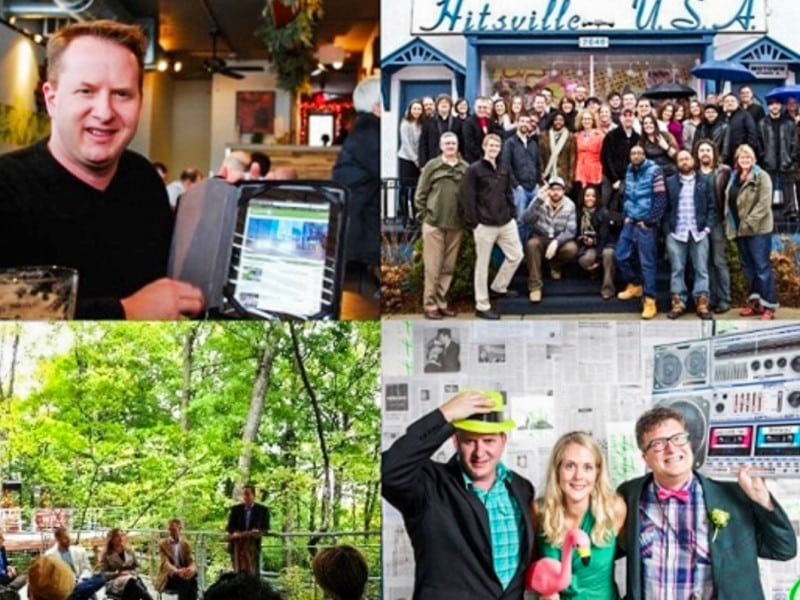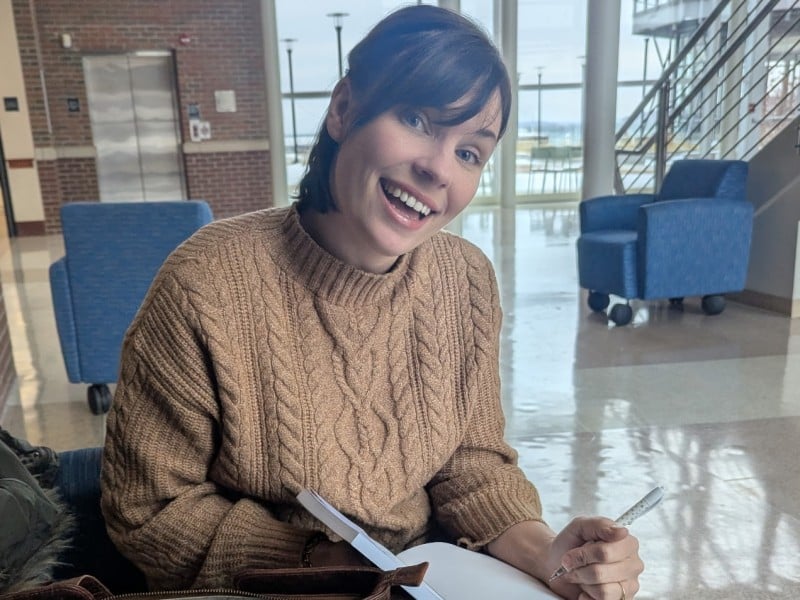Madison Squares’ New Path to Prosperity
The transformation of a dingy old industrial building on Madison Avenue into a hub for high tech business will bring as many as 160 new jobs to Madison Square. It’s also helping to anchor and catalyze a multi-million dollar makeover of the surrounding neighborhood.
My breath comes quickly in the musty heat as I top the flight of narrow wooden stairs. I step inside cautiously. The heavy wooden door creaks closed behind me. A single fluorescent bulb hums overhead. The wood floor—so solid I can’t make it squeak—absorbs the sound of my footsteps. I stop and peer into the distant, dark corners of this abandoned behemoth.
I’m in some alien world, on some deserted moon that’s covered with the dust of the ancients… and all around me … is… space. Lots and lots of space.
Space…the final frontier…
But this space is not the final frontier. It’s just the beginning.
The behemoth, the former P.B. Gast & Sons warehouse at 1515 Madison SE, is the site where the Madison Square Neighborhood is forging a new frontier in one of the city’s ten virtually tax-free Renaissance Zones.
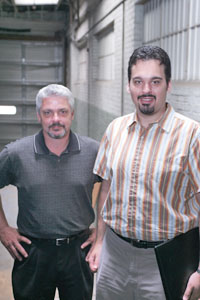 Horace Demmink, CEO of PathWay Internet Services, bought the 100-year-old building last spring and launched a $2 million renovation project to create a state-of-the-art high tech center. Renamed The Hubb, a play on computer terminology and an acronym for “Horace’s Ugly Building,” the building’s 53,000 square feet of floor space will be re-created as Chicago-style loft offices, with 6,600 square feet dedicated to a data and network room.
Horace Demmink, CEO of PathWay Internet Services, bought the 100-year-old building last spring and launched a $2 million renovation project to create a state-of-the-art high tech center. Renamed The Hubb, a play on computer terminology and an acronym for “Horace’s Ugly Building,” the building’s 53,000 square feet of floor space will be re-created as Chicago-style loft offices, with 6,600 square feet dedicated to a data and network room.
The building became home to PathWay’s thirteen employees in April when the company consolidated its Greenville and Grand Rapids offices. At full capacity, it could house hundreds of professional and technical workers in offices custom designed to fit the needs of the tenants.
“This will be a professionally renovated, quality office space,” Demmink said, “and the high tech services we’re planning to bring into this area will be second to none. Not only will there be jobs in this building, but the workers will need to eat lunch and buy gas and stop at the grocery story on their way home. As customers and vendors come in and out, they will also help the businesses in this neighborhood.”
A Pioneering Path
Steve Faber of City Vision, Inc., a non-profit organization instrumental in revitalizing the Madison Square Neighborhood, sees The Hubb as part of the continuing process to rebuild the economic and social vibrancy of the area.
“It anchors a part of the neighborhood that used to have a big employer,” Faber said. “The renovation is significant in that it’s converting an industrial building into commercial property, and it’s part of the broader shift in the Michigan economy toward high skill, high pay workers.”
Other changes may not be far off. One block south of The Hubb lies South Field, the former football field of the old South High School. Faber has been part of a design charrette, an intense urban planning technique that solicits ideas from urban leaders, developers, and residents, to create residential and entertainment areas at South Field. The hope is to convert the field into two baseball diamonds and an outdoor amphitheater, with condominiums and townhouses around the perimeter.
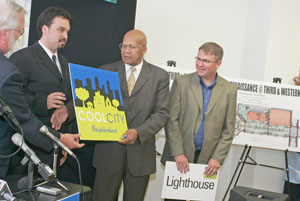 “Representative Vern Ehlers and other politicians are trying to find dollars to help revitalize this field,” Faber said. “Right now, it’s still a pipedream, but it’s less of a pipedream than it’s ever been before.”
“Representative Vern Ehlers and other politicians are trying to find dollars to help revitalize this field,” Faber said. “Right now, it’s still a pipedream, but it’s less of a pipedream than it’s ever been before.”
A lot of work remains, including facelifts for The Hubb and other buildings. A $100,000 catalyst grant, awarded on July 20 by the Cool Cities Neighborhoods in Progress Program, will help three organizations get started—PathWay, Neighborhood Ventures, and RENEW, LLC. PathWay receives $50,000 of that money.
“We applied for the grant in PathWay’s behalf,” said Ana Aguilar, grants administrator for Lighthouse Communities, a community development corporation. “All the designees will have access to the Cool Cities Resource Tool Box where there are over 100 funding opportunities, and they will receive preference when applying for future grants.”
This means that these three organizations could bring hundreds of thousands of additional dollars into the neighborhood. Politically speaking, in order for the Cool Cities initiative to be successful, it has to provide the resources to keep furthering the projects it started.
“Seeing that building going from being boarded up to aesthetically pleasing will do a lot for the neighborhood,” said David Allen, Lighthouse’s executive director. “We’re working hard to capture this type of business in the neighborhood to support the retail businesses. Several businesses are looking to relocate here. PathWay’s move adds to their confidence level.”
Inviting Spaces, Dining Al Fresco, and Plenty of Bandwidth 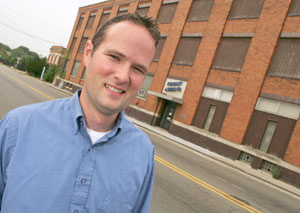 Tony Pearson, president of real estate operations for True North, the company handling the architectural modifications, construction, and leasing of The Hubb, said the building is in great shape.
Tony Pearson, president of real estate operations for True North, the company handling the architectural modifications, construction, and leasing of The Hubb, said the building is in great shape.
“It is a rock solid tank,” Pearson said. “It just needs to be updated to give the appearance of a Class A office building.”
The plan is to remove additions made to the building over the years and bring the structure back to its original shape. “On the south side, we’ll create a courtyard entry and outdoor eating space for people who work in the building,” Pearson said. “The interior will have exposed brick walls with exposed wood beams and a wood ceiling.”
PathWay also plans to expand their high tech services.
“It became apparent to us that this acquisition would allow us to increase our co-location services,” said Ted Miller, director of sales and marketing.
Co-location offers customers a facility designed to house their high tech hardware and equipment in a controlled environment with regulated power, dedicated Internet connection, and security.
“If you own an Internet-based business with a huge website that needs to be up all the time,” Miller said, “you’d have to have reliable infrastructure to run that bandwidth. That could cost you thousands of dollars a month. Because PathWay already has the bandwidth, you could co-locate your equipment with us for a fraction of that.”
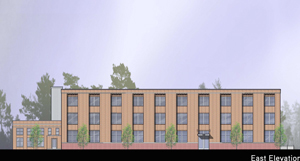 Co-locating at an off-site facility can be problematic, but PathWay says they have the solution. “Normally, when you co-locate,” Miller said, “your servers are one place, and you’re someplace else. If the servers go down and you can’t get them back up remotely, your business is dead in the water. By having offices in the same building as their servers, businesses can co-locate themselves here, right along with their equipment.
Co-locating at an off-site facility can be problematic, but PathWay says they have the solution. “Normally, when you co-locate,” Miller said, “your servers are one place, and you’re someplace else. If the servers go down and you can’t get them back up remotely, your business is dead in the water. By having offices in the same building as their servers, businesses can co-locate themselves here, right along with their equipment.
“We’ve tried to come up with reasons it won’t work,” Miller added, “and we haven’t been able to.”
Space may be the final unexplored frontier for the world, but for Grand Rapids, it seems there are plenty of old frontiers just waiting for re-discovery.
Photographs by Brian Kelly – All Rights Reserved
Image descriptions top to bottom:
The former P.B. Gast & Sons building at 1515 Madison SE
Ted Miller (left) and Horace Demmink (right) of Pathway Internet Services
Horace Demmink receives a $50,000 grant to help with the buildings facelift
Tony Pearson with True North is marketing the available commercial space.
Rendering of 1515 Madison SE – courtesy of True North

